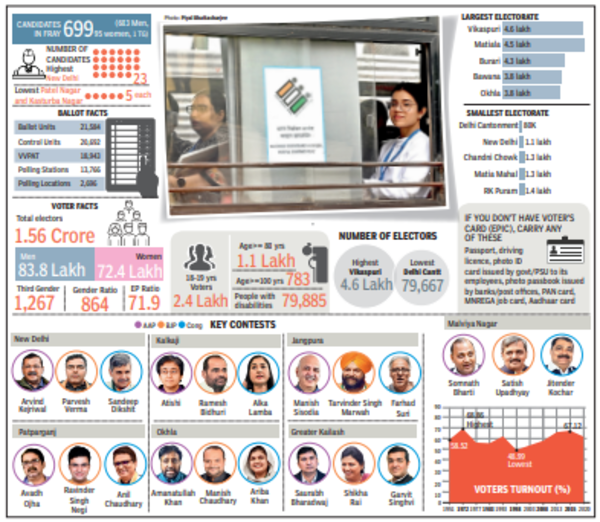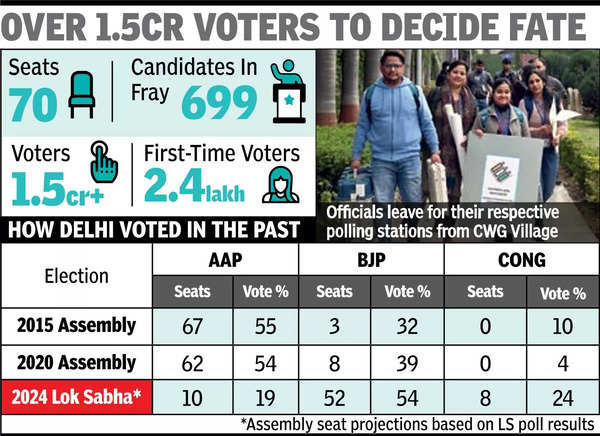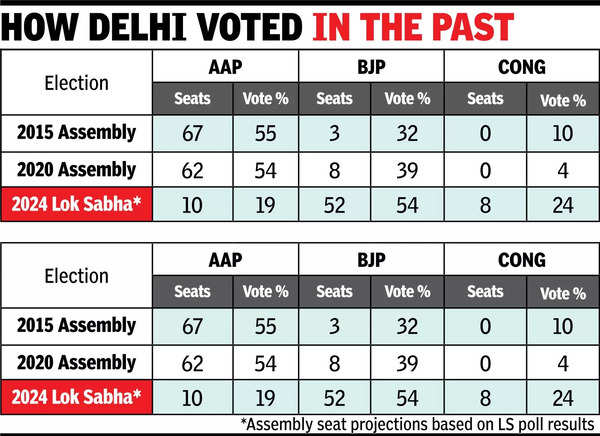NEW DELHI: The stage is set for a gripping three-way contest that will not only shape the future of the capital but also determine the political fate of its three main contenders.
More than 1.5 crore eligible voters will have the chance to choose their representatives for the 70-member Delhi assembly from a pool of 699 candidates – 603 men, 95 women and a third-gender person – who have campaigned vigorously over the past two weeks. The polling booths will open at 7am and voting will continue till 6pm.
The last two assembly elections were one-sided with AAP winning two huge mandates. BJP could barely manage to mark its presence in the assembly and Congress was almost decimated. In 2015, AAP romped home with 54.6% vote share and a record 67 seats with the remaining three going to BJP. The 2020 assembly elections saw AAP’s vote share and seats drop only marginally to 53.6% and 62, respectively. BJP won the remaining eight seats and Congress failed to open its account yet again.
The three political parties are engaged in a fierce electoral battle once again and have spared no effort in wooing the electorate. Most of the promises made in their election manifestos have a similar ring.

Several seats are going to witness a keen contest this time. While AAP chief and former CM Arvind Kejriwal is facing a stiff challenge from BJP’s Parvesh Verma and Congress’s Sandeep Dikshit, both former MPs from different constituencies in different years, CM Atishi is pitted against BJP’s Ramesh Bidhuri, another former MP, and Congress’s Alka Lamba.
As the city votes today, several contests would be closely watched, among them former deputy CM Manish Sisodia, who has shifted from Patparganj to Jangpura, where BJP’s Tarvinder Singh Marwah and Congress’s Farhad Suri are his two main rivals. In Ballimaran, there is a keen contest between Congress heavyweight and former minister Haroon Yusuf and incumbent AAP minister Imran Hussain.
Greater Kailash, Malviya Nagar, Gandhi Nagar, Mangolpuri, Patparganj and Matia Mahal are some of the other seats of immense consequence this time.
AAP has promised a number of new welfare schemes, which, it claims, will help families make huge savings. It has showcased free electricity and water provided to frugal consumers and free travel for women in public buses as some of its schemes which, along with “good education and health”, have helped each household make a monthly saving of nearly Rs 25,000. The party has also claimed that a monthly honorarium of Rs 2,100 for eligible women, free treatment for senior citizens and free travel for students in buses will save another Rs 10,000.

While promising to continue the schemes run by the AAP-led Delhi govt, BJP – which has not won a single assembly election in Delhi after 1993 – has promised a monthly honorarium of Rs 2,500 to women besides increasing the pension for senior citizens; implementation of the Ayushman Bharat healthcare scheme for senior citizens; a monthly pension for small traders and entrepreneurs; paid internship for the youth; and a gas cylinder at Rs 500 for the poor.
For Congress, it is a matter of survival and staying relevant in city politics. Its campaign was aimed at wresting at least a section of its vote bank from AAP. The party has assured Rs 8,500 per month to the unemployed for a year; Rs 2,500 a month for women under ‘Pyari Didi Yojana’; an insurance cover of Rs 25 lakh every year; and zero bills for consumers using up to 300 units, if it elected to office.
A bitter campaign that ended on Monday saw AAP, BJP and Congress hurl allegations at each other. Regular representations were made by all three parties to EC, accusing each other of violating the model code of conduct. Interestingly, all three parties this time have an exclusive focus on Poorvanchalis, who form almost one-fourth of the total vote share. Not only have the three parties given tickets to several candidates from the region, BJP has even allied with political parties of Bihar – Janata Dal (United) and Loktantrik Janshakti Party (Paswan) – and allocated them one seat each.

The Delhi election office, meanwhile, has promised a “free and fair” poll in the city. According to chief electoral officer R Alice Vaz, nearly 1.1 lakh civil officials – polling teams, counting staff, flying squad, sector magistrates, expenditure monitors, control room officials, micro observers and volunteers – and 60,000 security personnel have been deployed.
There are nearly 82.7 lakh men and 72.4 lakh women eligible to cast their votes on Wednesday at 13,766 polling booths spread across 2,696 locations across the city.
Vaz added that 21,584 ballot units, 20,692 control units and 18,943 VVPAT machines have been procured to conduct the polls. “A paid holiday has been declared for employees working in govt and private sectors as well as for those employed in shops and commercial establishments. This move, aimed at facilitating voter participation, also applies to voters from bordering states, UP and Haryana, who are employed in Delhi,” Vaz said.
While voting will take place till 6pm, Vaz said all voters standing in a queue at 6pm will be allowed to cast their vote. “ECI has issued clear directives, prohibiting the use of mobile phones, cameras, smartwatches and any other electronic items inside the polling stations,” Vaz said.
The CEO said that all polling stations will be closely monitored by her office and also by the offices of the district election officers through webcasting.
